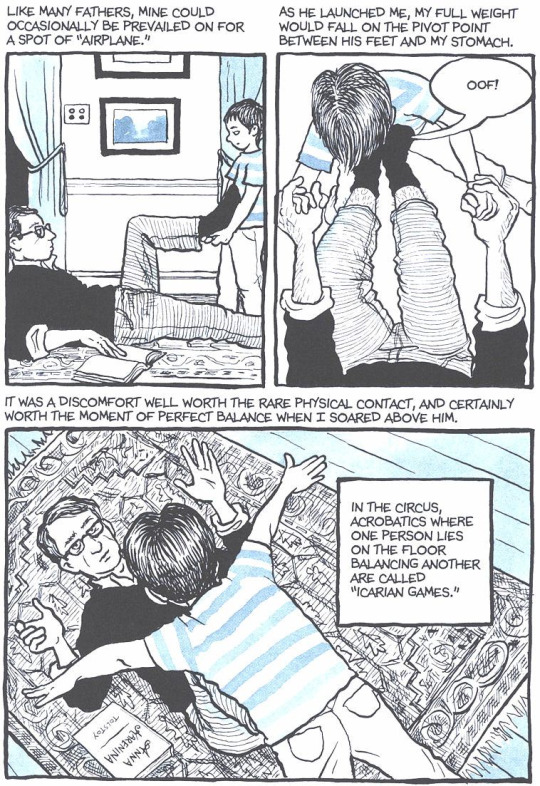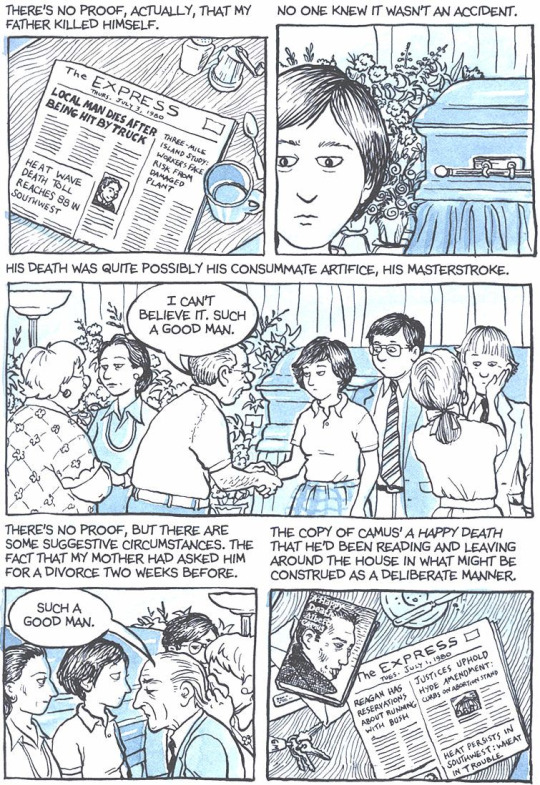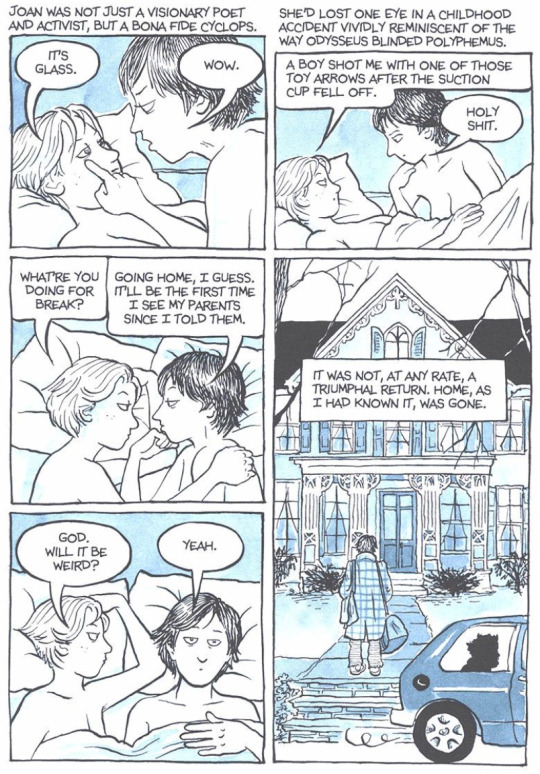Don't wanna be here? Send us removal request.
Text
Alison Bechdel’s ‘Fun Home: A Family Tragicomic’
‘Fun Home: A Family Tragicomic’ is a graphic novel written by Bechdel in 2006. It is a memoir and follows Alison through her childhood and into her adulthood, mainly through her interactions with her father. Before reading ‘Fun Home’ I don’t think I had ever read a graphic novel, so I was perhaps a bit sceptical about how effectively a story could be told in this means. It is safe to say I am a convert, the story of Alison and her family was told in such a meaningful way that engaged me so greatly that I finished the book in one sitting, not taking my eyes off it for a second.
This graphic novel explores many themes, most of them heavy. The major themes I picked up on are sexuality, suicide, mental health, gender dysphoria and emotional abuse. The themes are clear from the beginning and are further explored throughout the entire book. For example, this image below is the first page, and instantly we are aware of the distant relationship between Alison and her father.

We learn throughout the novel that the father is gay and has not come out to anyone, despite a few occasions that we learn he has been in trouble for interacting in some way with ‘young boys’: we don’t ever hear the details of this, but the allusions are clear. He is also suffering from bipolar disorder and spends a great deal of his time fixated on improving his house and his own appearance. As Alison states 'he used his skilful artifice not to make things, but to make things appear to be what they were not’. He more or less interacts with his wife and children to keep up appearances, and treats them quite poorly, 'I grew to resent the way my father treated his furniture like children and his children like furniture'.
Within the first chapter, we learn that around the age of 20, Alison finds out that her Dad has died, most likely by suicide. This happens soon after she comes out to her parents as gay, and she feels as if this news made some sort of impact on her father that pushed him over the edge. It is interesting because even Alison admits that there is no proof that he committed suicide, but she and the rest of her family go along with this narrative through most of the novel.

Schneider (2010) states that a huge aspect that makes ‘Fun Home’ stand out is the inclusion of many, many intertextual references. At the beginning she refers to her father as Daedalus who is the creator of the Labyrinth from Greek Mythology and as a ‘mad scientist’ which alludes to Mary Shelley’s ‘Frankenstein’. These allusions are really effective in adding to the readers’ overall understanding of each character. The intertextual references do become more and more frequent to where they are almost overwhelming by the end of the book. Alison becomes almost obsessed with the story of ‘Ulysses’ by James Joyce. Although this does make sense as it appears to be a book that her and her father sort of ‘bond’ over near the end of his life.

Because of their tumultuous relationship, Alison barely grieves for her father and continues with her life that she has filled with much more happiness than was ever given to her as a child. There is hope for her future where there was none for her father, but you have to wonder how much was that the responsibility of anyone else but him. As much as I, the reader, sympathises with the father, I can also understand that Alison has to absolve herself of any feeling of responsibility because that is what she deserves.
0 notes
Text
Ginsberg’s ‘Howl’
I love and always have loved poetry from a young age. My grandmother was a published poet and so I just thought that was the coolest thing growing up. I read a lot of Byron, Plath, Keats, Blake and Wilde during my high school days, trying to find meaning in poetry that I wasn’t sure I could find anywhere else. Despite this, I honestly struggle to understand a lot of poetry, often having to read lines over and over again until I grasp any sort of meaning what so ever. However, over time I have come to realise that you don’t necessarily have to understand everything about a poem to enjoy it; this is exactly what I found when reading ‘Howl’ by Allen Ginsberg. When reading this poem, I would start each line and get so excited that I understood it, only to get to the end of the line being completely confused all over again.

For example there is this line: ‘whole intellects disgorged in total recall for seven days and nights with brilliant eyes, meat for the Synagogue cast on the pavement’.
Reading Stephenson’s (1990) essay made me feel a lot better as he states that so much of the poem is about personal experiences that cannot be fully understood by the reader, however ‘the personal communications are universal. The images are ultimately autonomous and multivalent engaging our poetic understanding by their very intensity and mystery’ (p. 54).
So I can appreciate this poem without really understanding it, because the language is captivating and I can gather the overarching message of it, as it is ‘unified with and the movement carried forward by recurring images of falling and rising, destruction and regeneration, starvation and nourishment, sleeping and waking, darkness and illumination, blindness and sight, death and resurrection’ (p. 52).
My favourite line of ‘Howl’ is:
‘Who hiccupped endlessly trying to giggle but wound up with a sob behind a partition in a Turkish Bath when the blond and naked angel came to pierce them with a sword.’
Again, I’m not sure I understand its meaning at all, but it sounds nice when I read it out loud and it’s fun to imagine the scene in my head.

1 note
·
View note